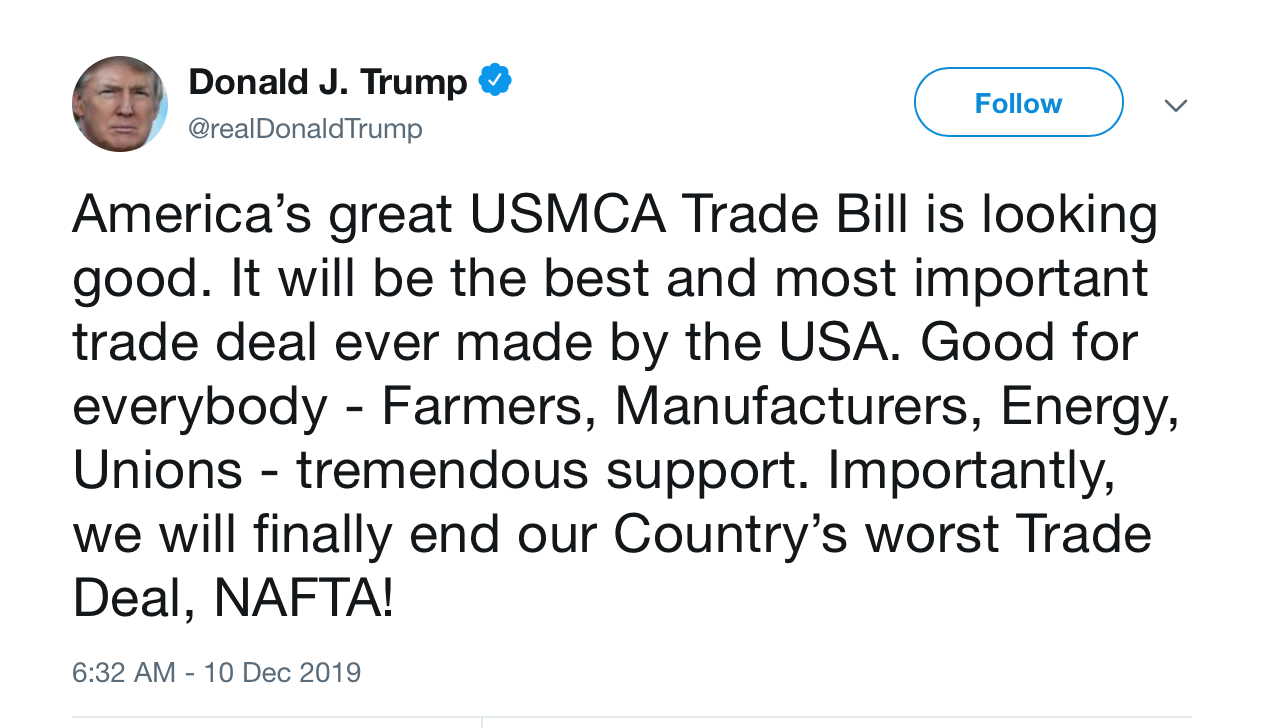After over a year of negotiation and changes, United States has signed off on the final version of a new trade deal with Canada and Mexico that will replace the 1994 North American Free Trade Agreement (NAFTA).
Nicknamed “NAFTA 2.0,” the U.S.-Mexico-Canada Agreement (USMCA) includes some key differences from its predecessor:
autos
Under USMCA, North American trading partners may qualify for zero tariffs on cars and trucks if 75 percent of its component parts are manufactured in Canada, Mexico, or the United States – a 12.5% increase from the previous 62.5 percent requirement. In addition, a significant amount of work (initially 30 percent, increasing to 40 percent by 2023) completed on the vehicle will have to be performed by workers earning a minimum $16/hour wage.
Canada and Mexico will also receive “side letters” from the U.S. excluding them from auto tariffs if they are implemented against other trade partners.
These new requirements may help raise the standard of living for some auto workers, consumers can expect car prices to increase and potential re-sourcing to countries in Asia.
mexico labor
The new agreement places great emphasis on increasing labor rights for Mexican workers – requiring minimum salaries for specific industries, providing easier opportunities for unionization, and meet benchmarks to Mexico-based labor attachés or face punitive penalties.
canadian milk
Canada’s complex dairy and milk program had notoriously placed high tariffs on U.S. dairy products, strictly controlling the local production as well as imports to keep the price high and ensuring Canadian dairy farmers don’t go bankrupt. While Canada will continue its complex dairy regime, it has agreed to increase the number of “Class 7” products that U.S. farmers can sell, as well an additional increase of U.S. eggs and turkeys.
intellectual property protection
Sixty plus pages outline increased protections for intellectual property rights, such as domain names, patents, trademarks and industry-specific protections.
environment
The USMCA also provides additional environmental protections against pollution and the overfishing of fish, whales and other marine wildlife. Specifically, all three North American nations have agreed to stop the subsidization of overfished species.
currency manipulation
Currency devaluation a prime strategy for countries to undercut American products on the global market. Under the U.S.-Mexico-Canada Agreement, all three countries have agreed to “market-determined exchange rates” with monthly reporting on currency manipulation.
chapter 19 stays & chapter 11 gone
NAFTA’s Chapter 19 trade resolution process has been kept intact – allowing Canada, Mexico and the United States to challenge each other’s anti-dumping and countervailing duties (ADCVD) in a representative panel, instead of the costly process of international trade courts.
Chapter 11, the dispute resolution process for businesses against new government changes, however, didn’t make the cut.
As Green continues to monitor the situation, stay up-to-date on freight news by following us on Facebook, Twitter, and LinkedIn. For continuous updates, make sure to check out our website at greenworldwide.com.






